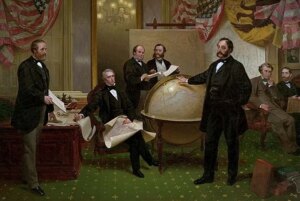Understanding Geopolitics: America’s Historical Ambitions in Greenland and the Arctic

At Extreme Investor Network, we pride ourselves on providing unique insights into the intricate dance of global economics and geopolitics. Today, we delve into a recent address by Russian President Vladimir Putin, where he sheds light on the long-standing ambitions of the United States regarding Greenland, a topic that dates back well over a century.
A Historical Perspective on U.S. Expansionism
In his speech, Putin pointed out that America’s desire to annex Greenland isn’t merely a modern whim — it is rooted in strategies that can be traced back to the 1860s. Secretary of State William H. Seward famously advocated for the annexation of both Greenland and Iceland during this period of American expansionism. His vision for these territories wasn’t just driven by modern-day economic interests; it stemmed from a keen awareness of their mineral wealth, fishing resources, and strategic military significance.
Denmark was once receptive to Seward’s ambitions, even valuing Iceland and Greenland at $5.5 million in gold. However, political resistance and skepticism — particularly among Republicans who deemed the proposal wasteful — stunted these early endeavors. With a wary eye on territory and influence, America believed that acquiring Greenland might even entice Canada into unity with the United States.
Yet, echoes of history reveal that initial efforts to expand American territory, like the purchase of Alaska in 1867, faced severe backlash; the media derided it as "Seward’s folly" for its perceived lack of value. Such public sentiment played a crucial role in thwarting earlier Greenland plans.
The Arctic’s Geopolitical Landscape Today
Fast-forward to the 20th century, and we see that America’s aspirations in the Arctic did not wane. Discussions among Denmark, Germany, and the United States in 1919 hinted at further territorial negotiations, but nothing materialized. Ultimately, World War II saw the establishment of U.S. military bases on Greenland to thwart Nazi advances, yet post-war attempts to formalize ownership fell flat.
In his recent address, Putin reiterated that the U.S. remains focused on its “geostrategic, military, economic, and political interests” in the Arctic. He emphasized that while the geopolitical tug-of-war often involves complex maneuvers and actors, the United States’ intent is clear. NATO’s increased militarization in the Arctic, particularly through troop training with Sweden and Finland, has sparked alarm in Moscow.
Putin remarked, “They are creating these problems with their own hands. Why? That’s entirely unclear.” This statement underscores the tension that exists between the Western powers and Russia, particularly in a region that is rich in resources and strategic importance.
The Future of Arctic Relations
As global temperatures rise, the Arctic holds more than just a path for shipping routes; it is a frontier that may soon see heightened competition over its resources. Iran’s research indicates that investments in Arctic infrastructure could enhance future collaboration amongst nations. Putin expressed an openness to partnership with "friendly nations," showing a nuanced approach in a historically fraught region.
At Extreme Investor Network, we believe that understanding the past is essential to making sense of current events and future trajectories. The United States’ interest in Greenland serves as a reminder that geopolitical aspirations often resurface in cycles. As the world grapples with the consequences of conflict and rivalry, we must be vigilant in understanding these historical patterns, lest we repeat them.
As observers of global economics and policies, it is vital to recognize that the path forward in the Arctic will not only be shaped by national interests but also by collaborative efforts and the normalization of relations. We must remain engaged with these developments, ensuring that resources are allocated wisely and partnerships are formed in good faith.
To ensure you get informed insights on critical economic and geopolitical issues, stay connected with Extreme Investor Network. We’re here to provide knowledge that empowers your investment decisions and fosters a deeper understanding of the world around you.

